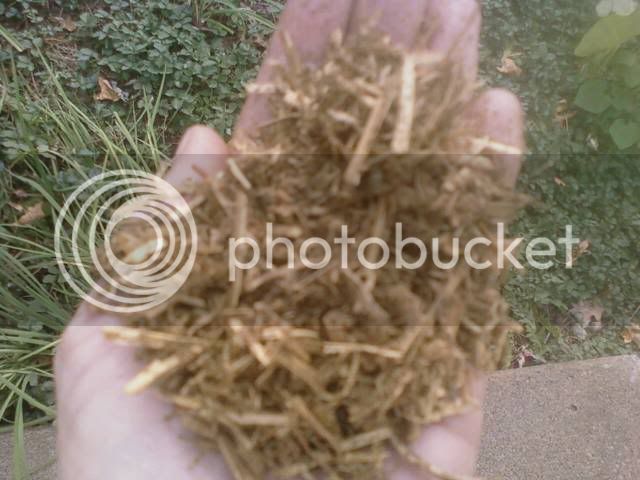I am another who doesn't like to not feed hay...and I feed a generous amount; all but the one described below gets some alfalfa AND some grass hay(here, that's a mix, usually of brome/orchard, sometimes w/ timothy, sometimes orchard only, always of good to excellent quality--don't like, won't feed, Bermuda...my personal choice), in proportions suited to each individual. That said, I have one mare, now 28 years old, who can no longer manage to properly chew hay (she's always had regular tooth care, and in fact, was 'done' again less than two weeks ago; her remaining teeth just can't do the job anymore; she 'guilted me, so I gave her a TINY handful of soft grass about three weeks ago...and shortly after, she choked! At the tooth floating, my vet opined that her teeth were likely the reason, and that might well be the case from now on, regardless of 'working on' her teeth--so, NO MORE hay!) She gets a 'complete' Senior feed from TC(@ 3 C./day), along w/ small alfalfa pellets(@4 1/2 C./day). This is keeping her in good condition...BUT, she is finished with her pellets very quickly, while the others are still eating their hay for a significant time afterwards.Luckily, she does not seem to 'stress' over it TOO much, though she often is clearly 'looking' for more of the 'eating experience', following me along the fence and sometimes giving her low nicker.(I should add, this mare will NOT eat soaked hay or soaked hay pellets...not gonna happen!)
I firmly believe that ALL of my others would be adversely affected by the frustration of not having enough of the 'grazing' experience; in fact, I've come to believe that providing enough of the kind of fiber that requires substantial chewing, as they would have in grazing(and which their digestive systems very specifically evolved to do)is the MOST IMPORTANT factor in maintaining digestive health(i.e., avoiding colic, ulcers,and other dangerous digestive upsets!)
I feel strongly enough that I've instituted 'slow-feeding' practices for all of my horses who eat hay, along with going to a three-times a day feeding schedule(actually, four times...I feed a 'full' feed of hay and(minimal)concentrates...in my case, TC Senior for the elderly mare, TC Lite alone or mixed w/ 'some' Senior for all the others, also stabilized ground flax, and salt added, to all..in the AM. Early PM, a lighter feed of hay; about 1 1/2 hrs. later, soaked beet pulp to all, w/ a very small portion of whatever concentrate each gets sprinkled over it. Then another GENEROUS feed of hay at bedtime.) Between the 'slow feeding' set-ups, and the generous amounts,my aim is to minimize the amount of time that they have NO fibrous feed in front of them.
I do NOT 'free feed' hay; with the high quality of the hay I feed, they'd all be WAY TOO FAT...and, with the cost of such hay, I can't see setting up for them to waste a good portion of their (grass) hay, which could be another result of such a practice.
I feed all of my horses but two, separately. I do have two geldings, my driving pair, together, because they eat at about the same speed, have similar appetites, and get a similar diet. They eat from a'homemade' 8' long feeder, originally built as a goat feeder, that I bought years ago(one of the best buys I ever made!) It is all-steel, hay rack of welded rebar above, feed bunkers below. Spacing between the hay rack 'bars' is about 3";to make it a 'slow feeder', I took a roll of welded wire w/ 2" X 4" openings, cut out four pieces as long as the hay rack, two pieces 16" wide, the other two 12" wide. I laid a 12" on top of a 16" with the spacing 'offset' to make all openings 2" X 2", then used a lightweight galv. wire to 'tie them together, maintaining those spacings, and did the same w/the other two pieces. Then I placed one 'completed piece at the bottom of each side of the 'V' of the hay rack,making sure the ends of the wires ties faced INWARD, and tied them to the rebar of the hay rack w/ cable ties, also making sure that the ends of these ties also pointed INWARD. It works VERY well; makes the horses work to get each bite of hay, and takes them at LEAST twice as long as before to consume an equal amount of hay! I may try building some similar 'inserts' for my 'hang-up' individual feeders,which I made out of 30 gal. plasic food-grade barrels and galv. thin-wall conduit many years ago!(I bought three of the "BUSY SNACKERS" slow-feed hay bags, but I can see that they aren't going to last as long as I'd hoped, and they are just too expensive, for me at least, to replace very often!
I hope this didn't seem too far OT; but I feel VERY strongly about horses needing to get a significant amount of long-fiber roughage. IMO, one might be able to 'get by' w/ a lesser amount of hay(if using hay pellets, hay cubes, soaked beet pulp, chopped hay, or some combo of same)by utilizing 'slow-feeding' techniques...but I REALLY believe that they should have SOME decent hay, always!I'd surely recommend doing as Marty is, and just keep looking until you find and get, just that....
Best of luck,
Margo
 ) Sooooo, I was thinking about the possibility of having to supplement my horses with beet pulp and alfalfa cubes and or pellets and might have to switch them over to this completely if the hay is too coarse for my "precious darlings
) Sooooo, I was thinking about the possibility of having to supplement my horses with beet pulp and alfalfa cubes and or pellets and might have to switch them over to this completely if the hay is too coarse for my "precious darlings
 "
"




